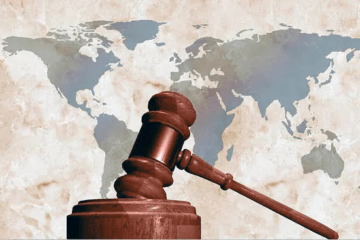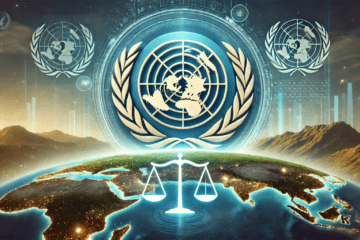
This Article is submitted by Aryan Raj Singh, 2nd semester B.COM. LL. B student of Guru Ghasidas Vishwavidyalaya
Abstract:
International jurisdiction is a crucial and complex aspect of the global legal landscape. This research explores the various dimensions of international jurisdiction, shedding light on its definition, scope, and challenges in the context of our increasingly interconnected world. The study begins by examining the different types of international jurisdiction, including territorial, personal, subject-matter, and universal jurisdiction, elucidating their respective applications and implications. The research then delves into the jurisdictional challenges arising from the digital age, exploring the complexities associated with cross-border internet activities, such as online transactions, data privacy, and cybercrimes. It further investigates the phenomenon of forum shopping and jurisdictional competition, analyzing their effects on the fairness and uniformity of the international legal system. Additionally, the research investigates jurisdiction in international dispute resolution, assessing the role of international courts and tribunals and the principles governing jurisdictional determinations. The concept of extraterritorial jurisdiction and its impact on state sovereignty and international relations are also critically examined. Furthermore, the study delves into jurisdictional immunities, exploring their purpose, exceptions, and recent developments in this area. Lastly, the research investigates efforts to harmonize and promote cooperation in international jurisdiction, analyzing regional arrangements, and the role of international organizations. By addressing these key points, this research aims to enhance understanding of international jurisdiction, offering insights into its intricacies and implications in a rapidly evolving global legal landscape.
Keywords:
International jurisdiction, Territorial jurisdiction, Personal jurisdiction, Subject-matter jurisdiction, Universal jurisdiction, Cross-border activities, Digital age, Internet jurisdiction.
Introduction:
In an era of globalization and interconnectedness, the boundaries of national jurisdictions are frequently tested and challenged. International jurisdiction, a pivotal aspect of the legal framework, determines the authority and power of a state to exercise control over individuals, events, and disputes that transcend national borders. Understanding the intricacies of international jurisdiction is essential for addressing legal conflicts, ensuring justice, and maintaining a harmonious global order. This research delves into the multifaceted landscape of international jurisdiction, examining its definition, scope, and implications. It explores the different types of jurisdictions, including territorial, personal, subject-matter, and universal jurisdiction, elucidating their applications and significance in an increasingly complex world. Additionally, the study investigates the jurisdictional challenges posed by the digital age, where the internet transcends physical boundaries and gives rise to intricate legal issues, such as online transactions, data privacy, and cybercrimes. Furthermore, the phenomenon of forum shopping and jurisdictional competition is scrutinized, revealing how parties strategically select favourable jurisdictions to influence legal outcomes. The implications of such practices on the fairness and uniformity of the international legal system are explored.
The concept of extraterritorial jurisdiction takes center stage, as states exercise authority beyond their borders, leading to debates on the boundaries of sovereignty and the potential for conflict among nations. Additionally, jurisdictional immunities, which protect states from being sued in foreign courts, are examined, along with exceptions and recent developments in this realm. Efforts towards harmonization and cooperation in international jurisdiction are also explored. Regional arrangements and agreements aim to establish common ground, while international organizations play a role in facilitating collaboration and uniformity in jurisdictional rules.
By undertaking a comprehensive analysis of these aspects, this research aims to enhance understanding of international jurisdiction, shedding light on its complexities and implications for the global legal landscape. Ultimately, the findings of this study contribute to the ongoing discourse surrounding international jurisdiction and pave the way for a more equitable and effective system of international governance.
Concept of International Jurisdiction:
The concept of international jurisdiction refers to the authority and power of a state or legal system to exercise control and apply its laws over individuals, events, or disputes that extend beyond its territorial boundaries. It is a fundamental aspect of the legal framework that governs interactions and conflicts between different nations or actors in the global arena.
International jurisdiction encompasses various dimensions, including territorial jurisdiction, personal jurisdiction, subject-matter jurisdiction, and universal jurisdiction. Territorial jurisdiction grants a state the power to enforce its laws within its physical boundaries. Personal jurisdiction relates to the authority over individuals based on their connection or presence within a particular jurisdiction. Subject-matter jurisdiction determines the types of cases or subject matters that a jurisdiction can adjudicate. Universal jurisdiction allows states to assert jurisdiction over certain crimes, such as genocide or crimes against humanity, regardless of where they were committed or the nationality of the perpetrator. With the advent of the digital age, the concept of international jurisdiction has faced new challenges. Cross-border activities conducted through the internet, such as online transactions or cybercrimes, raise complex issues regarding which jurisdiction’s laws should apply and which courts have the authority to resolve disputes. The borderless nature of the digital realm has blurred traditional notions of territoriality and necessitated the development of novel approaches to address jurisdictional conflicts.
Another significant aspect is forum shopping, wherein litigants strategically choose a jurisdiction that is most favourable to their case, leading to jurisdictional competition among different legal systems. This practice can potentially undermine the fairness and uniformity of the international legal system, as different jurisdictions may reach divergent outcomes on similar matters. The concept of extraterritorial jurisdiction is another important consideration. It refers to a state’s exercise of authority beyond its own territory, potentially impacting other states’ sovereignty. This concept often arises in areas such as human rights, economic sanctions, and antitrust laws, where states seek to regulate or impose legal obligations on actors operating outside their borders.
Furthermore, jurisdictional immunities come into play, protecting states from being sued in the courts of other states. Exceptions and limitations to jurisdictional immunities have been recognized in cases involving commercial activities, human rights violations, or when a state voluntarily waives its immunity. Efforts to promote harmonization and cooperation in international jurisdiction have been undertaken. Regional arrangements, such as the European Union’s Brussels I Regulation, aim to establish common rules and facilitate the recognition and enforcement of judgments across member states. International organizations, including the United Nations and the International Law Commission, contribute to the development of principles and guidelines to foster cooperation and uniformity in jurisdictional matters.
Types Of International Jurisdiction:
1.Territorial Jurisdiction:
Territorial jurisdiction is the most fundamental type of jurisdiction exercised by a state. It grants the state the authority to enforce its laws and regulations within its territorial boundaries. This jurisdiction extends to individuals, events, and activities occurring within that territory. States exercise territorial jurisdiction over their citizens and residents, as well as visitors and foreigners present within their borders. Territorial jurisdiction forms the basis for the legal system’s control and governance over its territory.
2.Personal Jurisdiction:
Personal jurisdiction, also known as jurisdiction based on nationality or citizenship, allows a state to exercise authority over individuals based on their connection to that state. It typically applies to citizens of a state, regardless of their physical location. Personal jurisdiction is based on the principle of allegiance and provides the state with the ability to regulate the conduct of its citizens, both within its territory and abroad. This type of jurisdiction often applies to matters such as taxation, military service, and consular protection.
3.Subject-Matter Jurisdiction:
Subject-matter jurisdiction refers to the authority of a state to exercise jurisdiction over specific types of cases or subject matters. It is based on the recognition that different states may have varying interests or expertise in certain legal matters. For example, a state may have exclusive subject-matter jurisdiction over issues related to its national security, immigration, or maritime activities. Subject-matter jurisdiction allows states to regulate and adjudicate cases pertaining to areas within their specialized knowledge or national interests.
4.Universal Jurisdiction:
Universal jurisdiction is a concept that asserts the authority of a state or an international court to exercise jurisdiction over certain crimes, regardless of where they were committed or the nationality of the perpetrator. It is primarily applied to grave offenses that are considered crimes against humanity or violations of customary international law, such as genocide, war crimes, or crimes against humanity. Universal jurisdiction aims to ensure that individuals responsible for such crimes do not escape accountability by taking refuge in other jurisdictions. This type of jurisdiction allows states or international bodies to prosecute and punish offenders even in the absence of a direct territorial or personal connection.
These types of international jurisdiction form the basis for legal systems to assert their authority and enforce laws in various contexts. Each type serves different purposes and reflects the principles and interests underlying the exercise of jurisdiction by states or international bodies. Understanding these distinctions is essential for comprehending the complex dynamics of international law and its application in a global context.
Implications and Benefits:
International jurisdiction has significant implications and offers several benefits in the global legal landscape. Firstly, it ensures legal order and stability by providing a framework for resolving conflicts and enforcing laws in a cross-border context. By clarifying which legal authority has the power to adjudicate and enforce laws, international jurisdiction promotes a predictable and fair international legal system. This, in turn, contributes to maintaining peace and stability among nations. Secondly, international jurisdiction facilitates global governance and cooperation. It enables states to address transnational issues and regulate cross-border activities effectively. By providing a mechanism for collaboration in areas such as trade, environmental protection, human rights, and combating international crimes, international jurisdiction promotes cooperation and coordination among nations. It allows states to work together to tackle shared challenges and foster a more harmonious global order.
Furthermore, international jurisdiction plays a crucial role in the protection of human rights and the administration of justice. It allows for the prosecution of individuals responsible for grave offenses, such as crimes against humanity, regardless of their location or nationality. International jurisdiction ensures that perpetrators of such crimes do not escape accountability by taking refuge in other jurisdictions. This contributes to the promotion of human rights, the rule of law, and the pursuit of justice on a global scale.
Moreover, international jurisdiction provides a framework for resolving disputes and conflicts between states and individuals involved in cross-border activities. It offers a means for parties to seek redress and ensures that their rights and interests are protected under applicable laws. By providing a clear legal framework for resolving conflicts, international jurisdiction helps to mitigate the risks of jurisdictional disputes and contributes to the efficient and fair resolution of legal matters.
Merits of International Jurisdiction:
The merits of international jurisdiction are substantial and have wide-ranging implications. Firstly, international jurisdiction provides a framework for resolving conflicts and disputes that transcend national borders. It ensures that legal matters involving multiple jurisdictions can be addressed in a fair and efficient manner, promoting the rule of law and access to justice on an international scale. Secondly, international jurisdiction enables the protection of human rights by allowing states to exercise authority over individuals who commit serious offenses, regardless of their location or nationality. This helps combat impunity for crimes such as genocide, war crimes, and crimes against humanity, ensuring that perpetrators are held accountable and justice is served. Furthermore, international jurisdiction facilitates global cooperation and coordination among nations. It allows states to work together on transnational issues such as terrorism, cybercrime, environmental protection, and the regulation of cross-border activities. By establishing shared jurisdictional principles and mechanisms, international jurisdiction promotes collaboration, collective security, and the advancement of common goals.
Moreover, international jurisdiction supports economic activities and international trade. It provides a legal framework for resolving commercial disputes that arise across borders, fostering confidence and trust in business transactions. This promotes economic growth, facilitates cross-border investments, and contributes to the development of a stable and predictable international business environment. Additionally, international jurisdiction plays a crucial role in the development and harmonization of international law. Through the application and interpretation of laws in cross-border cases, international jurisdictions contribute to the evolution of legal principles and the establishment of precedents that guide the conduct of states and individuals in the international arena. This helps foster consistency, predictability, and the progressive development of global legal norms.
Drawbacks/ Demerits of International Jurisdictions:
While international jurisdiction offers numerous benefits, it also presents certain drawbacks and challenges. It is important to acknowledge these demerits to have a comprehensive understanding of the topic.
One of the drawbacks of international jurisdiction is the potential for jurisdictional conflicts and forum shopping. Jurisdictional conflicts arise when different legal systems assert their authority over the same case or individuals, leading to uncertainty and delays in the resolution of disputes. Forum shopping occurs when litigants strategically choose a jurisdiction that is most favourable to their case, which can undermine the fairness and uniformity of the international legal system. These practices can create inefficiencies, increase litigation costs, and lead to inconsistent outcomes across jurisdictions.
Another challenge is the issue of extraterritorial jurisdiction. When states assert jurisdiction beyond their territorial boundaries, it can encroach upon the sovereignty of other nations. This can result in tension and conflicts between states, as it involves one state applying its laws to activities or individuals outside its jurisdictional limits. Balancing the exercise of extraterritorial jurisdiction with respect for the sovereignty of other states is a complex and sensitive matter. Furthermore, the digital age has brought about new challenges in international jurisdiction. Cross-border activities conducted through the internet, such as e-commerce, data privacy, and cybercrimes, raise unique jurisdictional issues. Determining which jurisdiction’s laws apply and which courts have the authority to resolve disputes in the online realm can be complex and challenging, as the internet transcends traditional notions of territoriality.
Additionally, the enforcement of international jurisdiction can be difficult, especially when states lack the resources or political will to enforce decisions made by foreign courts. This can lead to practical challenges in ensuring compliance with judgments or decisions rendered in cross-border cases. In some instances, states may refuse to recognize or enforce foreign judgments, which can impede the effectiveness of international jurisdiction. Lastly, there may be variations in legal systems and cultural norms across different jurisdictions. This can lead to divergent interpretations and applications of international jurisdiction, creating potential disparities in outcomes and raising questions about the fairness and uniformity of the international legal system. In conclusion, while international jurisdiction offers numerous benefits, it also presents challenges and drawbacks such as jurisdictional conflicts, forum shopping, extraterritorial jurisdiction, complexities in the digital realm, enforcement difficulties, and variations across legal systems. Addressing these demerits requires ongoing efforts to promote cooperation, harmonization, and the development of clear and consistent rules in international jurisdiction.
CASES RELATED TO INTERNATIONAL JURISDICTION:
1. Filartiga v. Pena-Irala (1980): This landmark case involved the exercise of universal jurisdiction by a U.S. court. It established that individuals could be held accountable for human rights abuses committed outside their home country. The case centered around the torture and killing of Joelito Filartiga, a Paraguayan citizen, by a Paraguayan police officer. The court’s ruling allowed Filartiga’s family to bring a civil lawsuit in the United States against the perpetrator, providing a significant precedent for human rights cases invoking universal jurisdiction.
2. The International Criminal Court (ICC): The ICC is an international tribunal with jurisdiction over individuals accused of genocide, war crimes, crimes against humanity, and aggression. It was established by the Rome Statute in 2002 and has handled several high-profile cases. Notable examples include the trial of former Congolese Vice-President Jean-Pierre Bemba for war crimes and the arrest warrant issued for Sudanese President Omar al-Bashir for crimes against humanity.
3. Exxon Mobil Corp. v. Government of Venezuela (2012): This case involved a dispute between Exxon Mobil and the Venezuelan government. Exxon Mobil filed a lawsuit against Venezuela after the government expropriated its assets. The case highlighted issues of nationalization and the exercise of jurisdiction by a state over foreign entity. It was arbitrated before the International Centre for Settlement of Investment Disputes (ICSID), demonstrating the role of international tribunals in resolving jurisdictional conflicts between states and foreign investors.
4. Google Spain SL v. Agencia Española de Protección de Datos (2014): This case, also known as the “Right to be Forgotten” case, dealt with the jurisdictional challenges arising from the digital realm. The European Court of Justice ruled that search engine operators like Google were subject to European Union data protection laws, even if they were headquartered outside the EU. The case examined the extraterritorial application of jurisdiction in the context of data privacy and the global nature of the internet.
Conclusion:
In conclusion, international jurisdiction is a crucial aspect of the global legal framework. It determines which legal authority has the power to address cross-border disputes, enforce laws, and hold individuals accountable for crimes committed outside their home jurisdictions. The topic of international jurisdiction carries significant implications and benefits, including the maintenance of legal order, the protection of human rights, the promotion of global cooperation, the facilitation of international trade, and the development of international legal standards. However, it also poses challenges such as jurisdictional conflicts, extraterritoriality issues, complexities in the digital realm, enforcement difficulties, and variations across legal systems. Understanding and effectively navigating international jurisdiction are essential for promoting a fair, stable, and interconnected global legal order.
References:
https://legal.un.org/avl/subject.aspx?subjectid=45
https://mea.gov.in/international-law-and-dispute-settlement.htm
https://www.manupatrafast.com/articles/PopOpenArticle.aspx?ID=fa756e34-bd0e-4d7e-852f-6c5303d9a80e
https://www.researchgate.net/publication/314200601_International_Jurisdiction_of_the_Indian_Courts
https://www.jstor.org/stable/43953757
CITATIONS:
___________________
- Filartiga v. Pena-Irala , 1980)
- The International Criminal Court (ICC)
- Exxon Mobil Corp. v. Government of Venezuela (2012)
- Google Spain SL v. Agencia Española de Protección de Datos (2014)




0 Comments